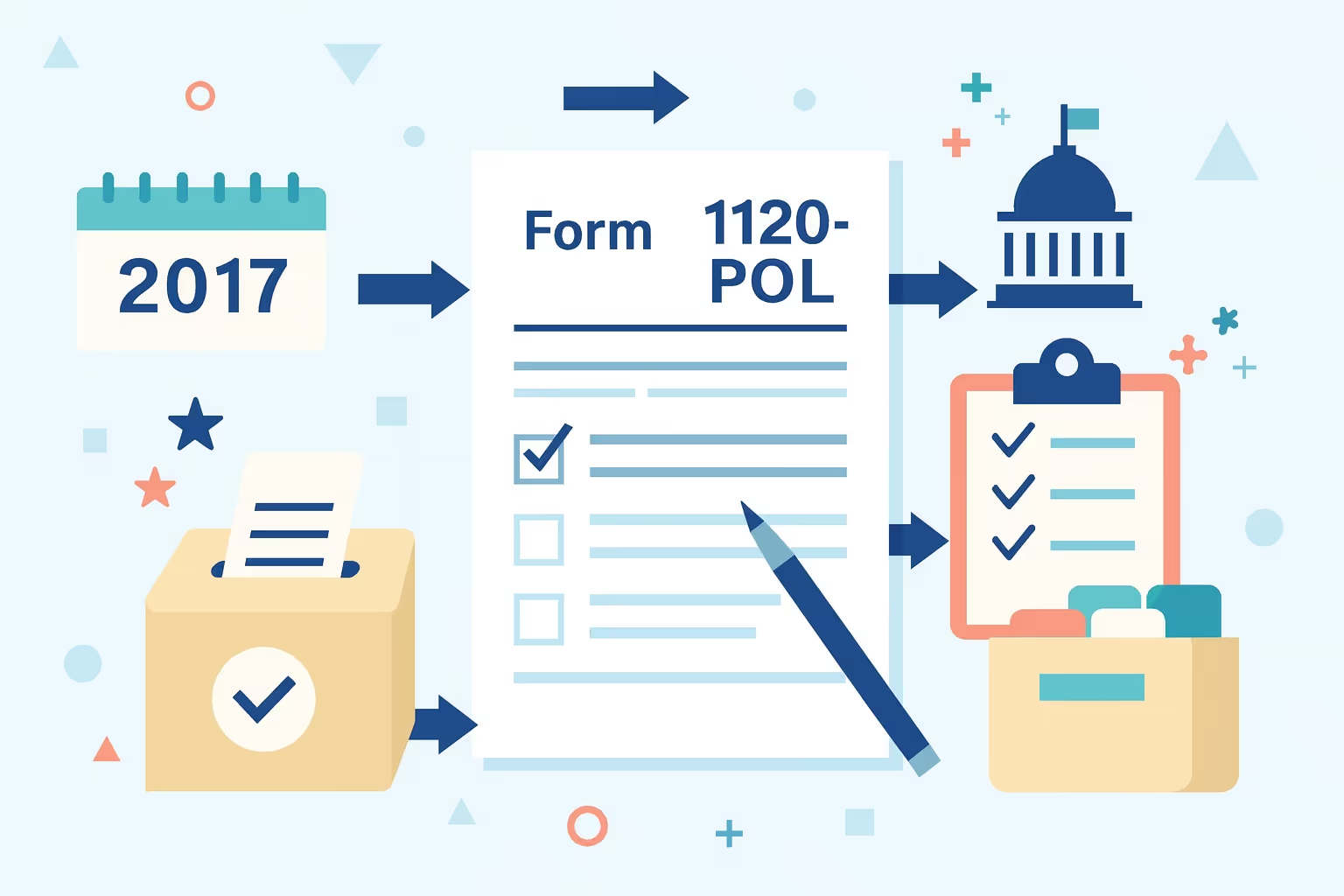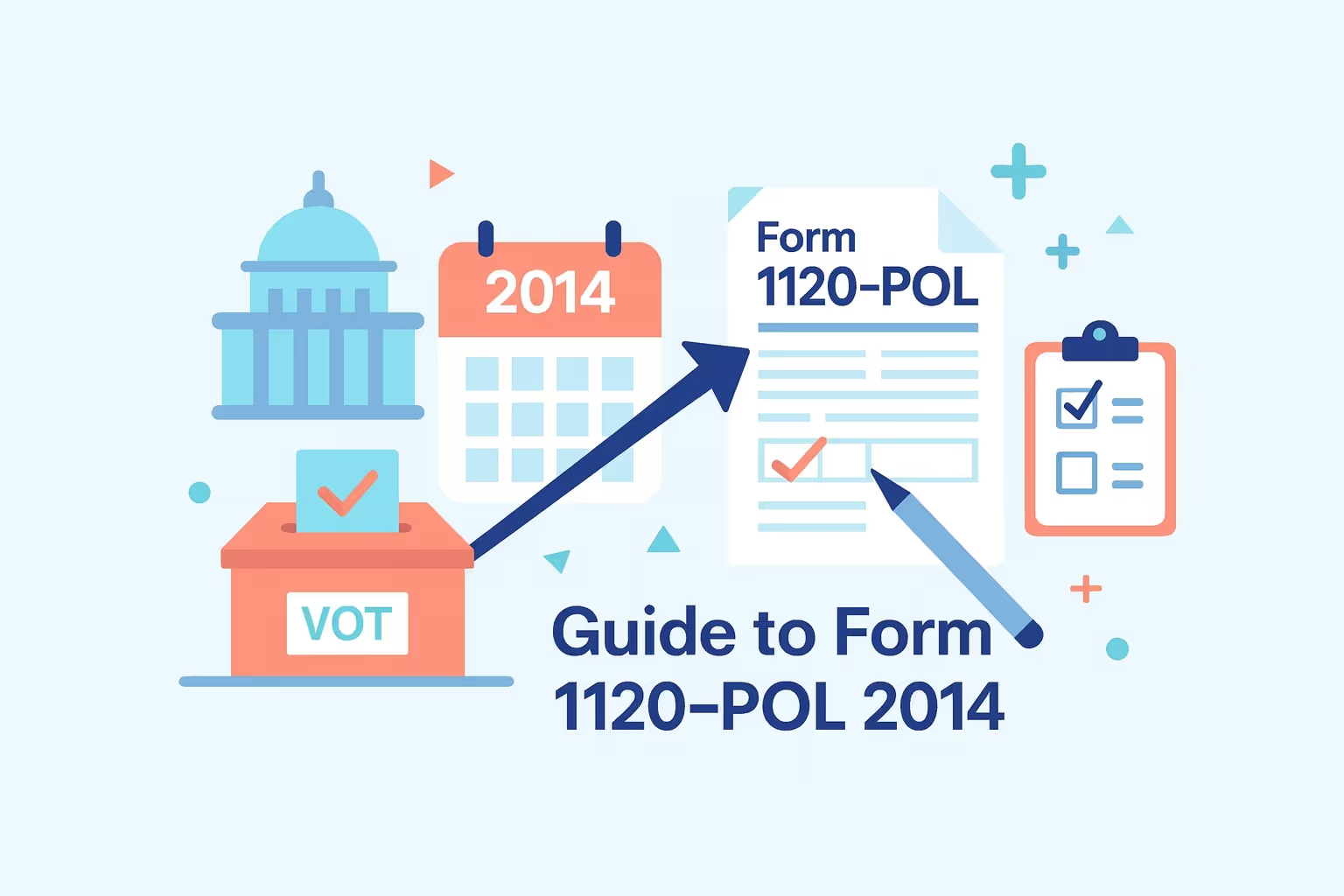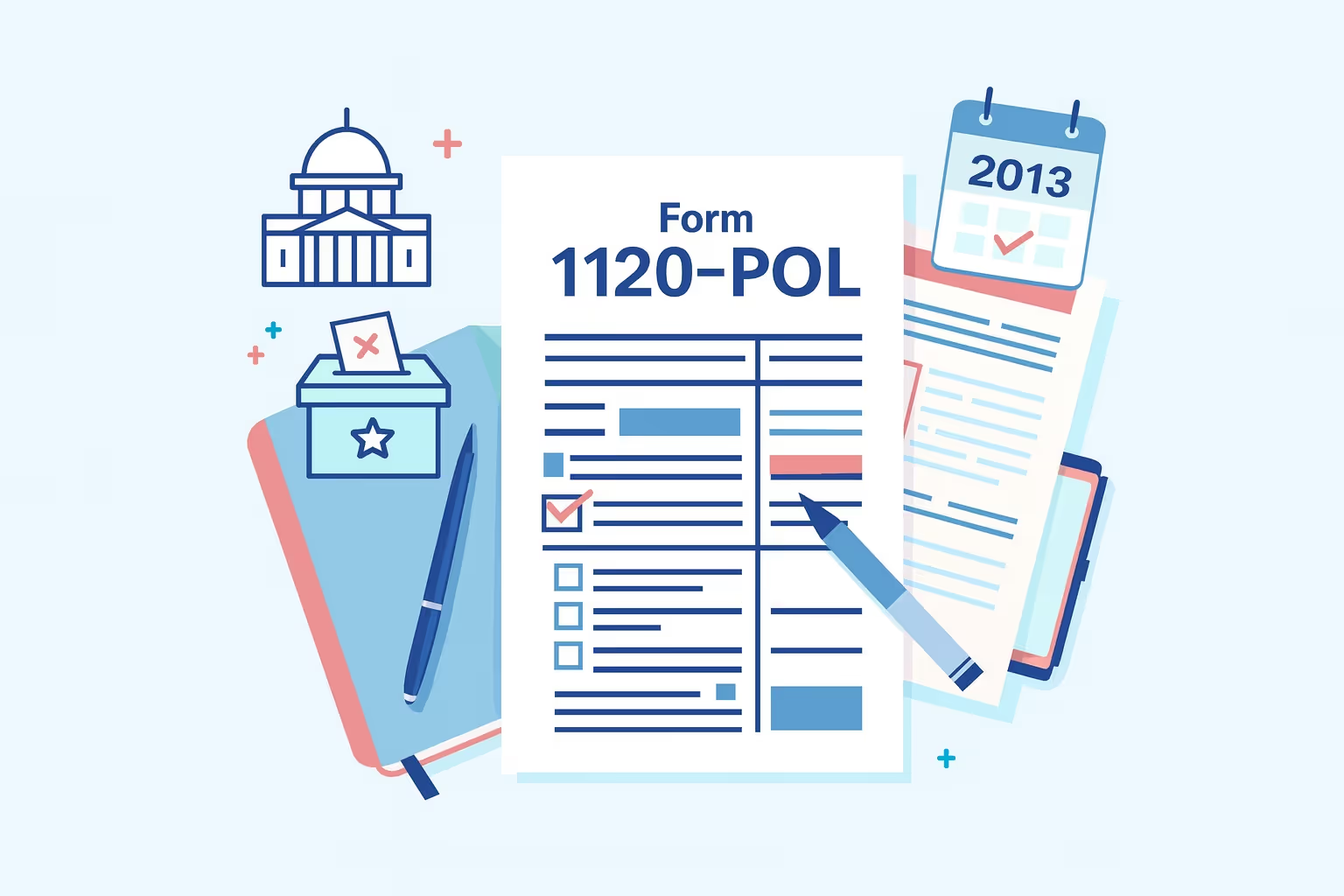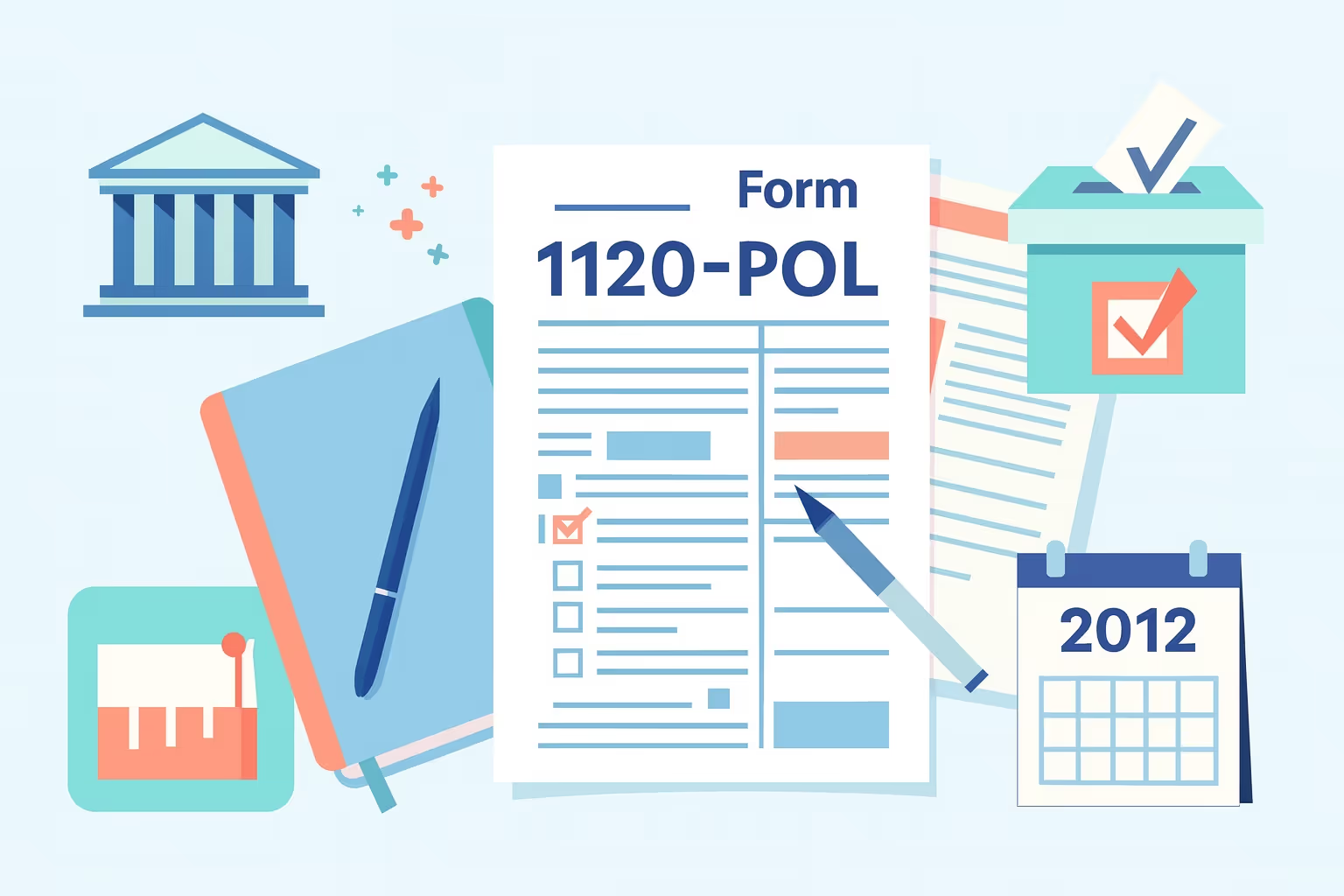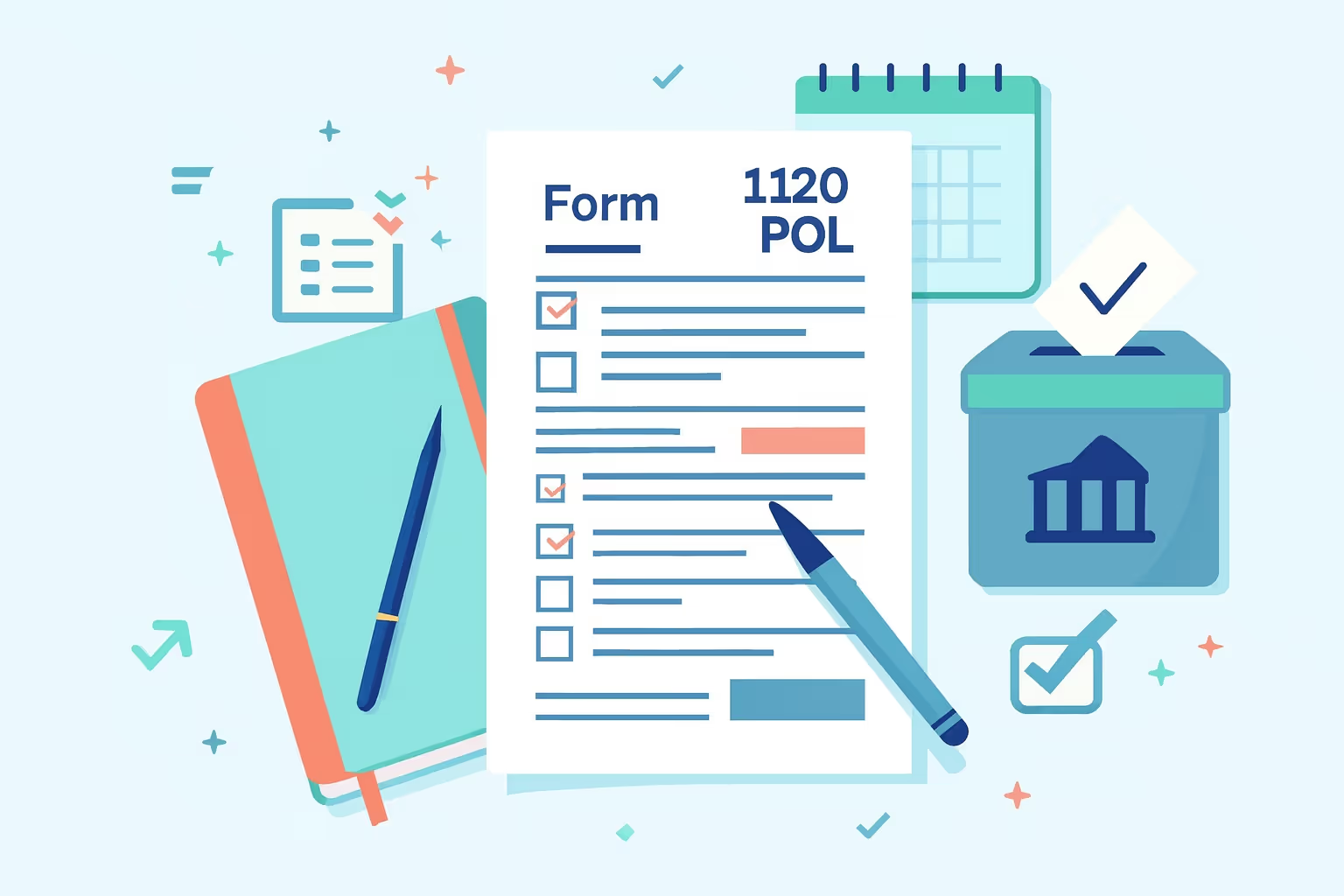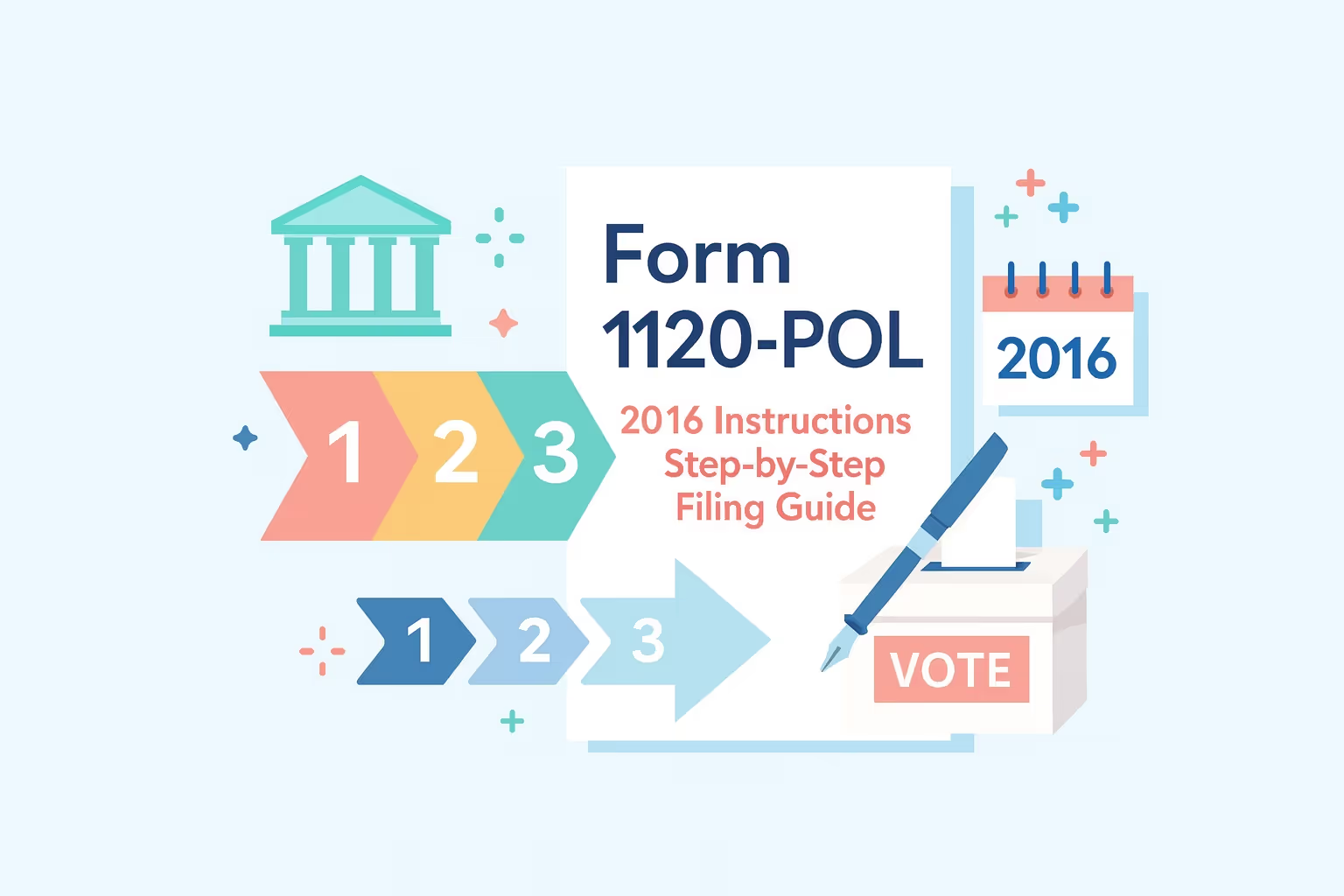
For the 2016 tax year, filing Form 1120-POL was not optional for political organizations with taxable income. The Internal Revenue Code requires this specialized income tax return to ensure organizations report their taxable income accurately and calculate the proper tax liability. Because 2016 brought important changes in deadlines and procedures, organizations needed to understand the filing process to maintain compliance.
Political organizations must follow federal reporting rules, from national committees to smaller local political organizations. These requirements promote transparency in financial activity, including income from investments, contributions, property sales, and other sources. Proper filing supports an organization’s ability to maintain its tax-exempt status and prevents costly penalties for failing to meet federal compliance standards.
The Internal Revenue Service (IRS) provides detailed tax forms, instructions, and resources that guide organizations in preparing a correct income tax return. By reviewing accounts, verifying expenditures, and gathering necessary documents in advance, organizations can complete the form efficiently and meet the due date. This guide walks through the process step by step, using the official Form 1120-POL 2016 instructions as a foundation for accurate and compliant filing.
Overview of Form 1120-POL 2016 Instructions
Form 1120-POL is the official income tax return that political organizations use to report taxable income. It applies to tax-exempt organizations and those established under section 527 of the Internal Revenue Code. Understanding the requirements is the first step toward accurate filing.
Who Must File Form 1120-POL?
- Political organization requirement: Every political organization with taxable income of $100 or more during the tax year must file the form.
- Exempt organizations requirement: Certain tax-exempt organizations must file if they engage in political activities that generate taxable income.
- Local public office requirement: Local political organization committees supporting a candidate for local public office may also need to file.
- Corporate involvement requirement: Corporations involved in political activities may need to report specific expenditures through the form.
Types of Political Organizations
- Principal campaign committees: These organizations are established to support a candidate for a federal election and are subject to special reporting rules.
- Political action committees (PACs): These accounts collect contributions and make expenditures supporting political activities under the Federal Election Campaign Act guidelines.
- Party committees: These organizations operate at national, state, or qualified state levels to support candidates and elections.
- Newsletter funds: These are established by candidates or officeholders to fund newsletters and may require different deductions reporting.
Key Changes for the 2016 Tax Year
Form 1120-POL filing requirements changed significantly in 2016. Political organizations must pay attention to the updated due date, available deductions, and overall process to ensure compliance. Returns were now required by the 15th day of the fourth month after the close of the calendar year, replacing the prior three-month rule.
Other Filing Considerations for 2016
- Electronic filing availability: Form 1120 POL could be filed electronically, though paper filing remained common for this year.
- Specific deduction rule: Political organizations other than newsletter funds continued to claim the $100 particular deduction against taxable income.
- Standard tax rate rule: Most organizations pay a flat 35% rate, but principal campaign committees use the graduated income tax rates for corporations.
Step-by-Step Form 1120-POL Filing Instructions
Filing Form 1120-POL requires careful attention to detail. Each organization must gather accounts, fill in accurate information, and report taxable income correctly to avoid penalties. The process involves structured steps outlined in the official IRS instructions for the 2016 tax year.
Step 1: Complete the Header Information
At the top of the form, the organization must provide its complete legal name, full mailing address, and employer identification number. The calendar year or applicable fiscal tax year should be clearly indicated. Boxes should be checked if the filing represents an amended return, a name change, or a final filing, ensuring that IRS records remain accurate.
Step 2: Report Income (Lines 1–8)
This section requires reporting all taxable income sources not exempted under the Internal Revenue Code. Organizations must include dividends, interest, capital gains, rental income, and gains from selling stock or other property. Contributions and political expenditures are excluded unless improperly segregated, in which case they must be reported as taxable income subject to federal requirements.
Step 3: Record Deductions (Lines 9–16)
Deductions are limited to expenses directly connected with producing taxable income, not general political expenditures. Organizations may include salaries tied to investment income, rent for income-producing property, depreciation, and related taxes. Each expense must be clearly documented and itemized to support the deduction claimed. Proper allocation helps maintain compliance and prevents errors that may increase tax liability during review.
Step 4: Determine Taxable Income (Lines 17–19)
Taxable income is determined by subtracting total deductions from reported income. Political organizations other than newsletter funds may claim the $100 specific deduction before finalizing the calculation. The result represents the taxable income figure used to compute the federal tax liability. Accuracy here ensures the correct application of deductions and prevents costly misreporting errors that may trigger penalties.
Step 5: Calculate Tax (Line 20)
At this stage, the organization must compute the tax due based on taxable income. Most political organizations apply a flat 35 percent rate. However, principal campaign committees must use the graduated corporate rates provided under the Internal Revenue Code for accurate tax calculation.
Step 6: Credits and Payments (Lines 21–25)
The final step of the form records credits, payments, and the resulting balance. Organizations should include previously made deposits, credits, or estimated payments. Any tax due after these adjustments must be paid electronically. Overpayments may be applied to future tax returns or requested as refunds.
How to File Form 1120-POL
Filing requirements for political organizations in 2016 allowed both paper and electronic submissions. Depending on availability, organizations had to choose the appropriate process to ensure the completed income tax return reached the IRS by the required due date.
Paper Filing Instructions
Paper filing remained the primary method for 2016. Organizations mailed completed tax forms to the IRS address listed in the official instructions. Confirming the correct mailing location was important, since addresses varied based on whether the organization filed from inside or outside the United States.
Electronic Filing Options
The IRS website allowed e-filing for Form 1120-POL through approved providers, though it was not mandatory. Many political organizations chose paper filing due to limited electronic options. However, E-filing offered faster processing, fewer errors, and direct confirmation that the agency had accepted the tax return.
Filing Deadlines and Extensions
The due date for Form 1120-POL returns was the 15th day of the fourth month after the tax year ended. Calendar year filers in 2016 submitted by April 15, 2017. Organizations needing additional time could request a six-month extension by filing Form 7004 with the IRS.
Payment Instructions
Meeting payment requirements was essential for compliance. All tax payments must be made electronically, with several methods available depending on timing and organizational preference.
Electronic Federal Tax Payment System (EFTPS)
In 2016, the EFTPS was the standard system for all federal tax deposits. Political organizations had to establish accounts and schedule payments in advance. Submissions completed by 8 p.m. Eastern the day before the due date were considered timely and compliant with IRS requirements.
Same-Day Wire Payment
Organizations that missed the EFTPS deadline could still make a same-day wire payment through the Federal Tax Application system. This option required coordination with a financial institution. Additional fees and earlier cut-off times often applied, so arrangements had to be established in advance to avoid missing the payment deadline.
Payment with Return and Business Days
Organizations could not mail payments with their tax forms. The IRS required all deposits to be made electronically or through authorized providers. Payments due on weekends or federal holidays were considered timely if submitted on the next official business day recognized by the agency.
Required Schedules and Other Forms
Beyond the main tax return, political organizations often needed to submit schedules or additional forms. These attachments ensured accurate reporting of gains, deductions, and credits while providing further information required under federal law.
Common Attachments
- Schedule D reporting: Organizations must file this schedule when they report capital gains or losses from selling property or stock.
- Form 4797 reporting: Organizations use this form to report sales of business property connected to income-producing activities for the political organization.
- Form 4562 reporting: This form is necessary when an organization claims depreciation or amortization deductions related to business assets or investments.
- Form 4136 reporting: Organizations use this form to claim credits for federal tax paid on fuels used in political organization activities.
Other Forms Required
- Form 8871 requirement: To secure an exempt status for political organizations, organizations must file this form within 24 hours of being established.
- Form 8872 requirement: Organizations must file this form periodically to report contributions and expenditures when Form 8871 is required.
- Form 990 or 990-EZ requirement: Organizations with gross receipts exceeding $25,000 must file one of these forms unless specifically exempted by federal rules.
Assembling the Return
The IRS required forms to be assembled in a clear order. The income tax return appeared first, followed by Form 4136 if applicable. Schedules were placed alphabetically, and additional forms were arranged numerically. Supporting statements and detailed attachments were included at the end for complete filing.
Common Mistakes to Avoid
Even experienced organizations made errors when filing Form 1120-POL. Awareness of these common issues reduced penalties and improved compliance.
- Reporting exempt income: Some organizations mistakenly report contributions or membership dues as taxable income when only ordinary income and gains are included.
- Failing to file Form 8871: Without Form 8871, all income becomes taxable, even contributions, creating unnecessary tax liability and expenses for the organization.
- Applying incorrect tax rate: Political committees sometimes applied the 35 percent flat rate when graduated rates were required for principal campaign committees.
- Deducting unrelated expenses: Organizations incorrectly deducted expenses not tied to producing taxable income, such as campaign expenditures, resulting in compliance issues.
- Forgetting the $100 deduction: Many organizations overlooked this specific deduction, which could have reduced their taxable income and federal tax liability.
- Using outdated deadlines: Some filers used the older three-month due date instead of the updated four-month rule established for tax year 2016 filings.
Zero Activity or Dormant Year Guidance
Some political organizations experience years without taxable income. Form 1120-POL may not be required in these cases, but certain considerations still apply for compliance and recordkeeping.
When You Do Not Need to File
Organizations with no taxable income from investments, property, or other sources during the tax year are not required to file Form 1120-POL.
Benefits of Voluntary Filing
Filing a return, even with zero income, begins the statute of limitations period. This helps define a clear start date for compliance monitoring and protects the organization from future disputes.
Record-Keeping Reminders
- Maintain financial accounts: Even in a dormant year, accurate accounts and bank statements should be preserved.
- Segregate exempt funds: Proper separation of exempt and taxable funds helps prove compliance if questioned later.
- Retain contribution records: Contributions, expenditures, and assets should still be recorded, even if no income tax return is required.
First-Time Filer Tips
Preparation is essential for organizations filing Form 1120-POL for the first time. New filers should establish systems that make compliance easier in future tax years.
Getting Started
New organizations must obtain an employer identification number and confirm their organizational type. They should set up proper accounts and filing systems to track contributions, investments, and expenditures throughout the year.
Understanding Political Organization Taxable Income
Taxable income includes dividends, interest, capital gains, and rental income. Contributions and political expenditures are excluded if appropriately segregated. Ordinary income from investments or other sources must be calculated carefully to determine accurate liability under the Internal Revenue Code.
Record-Keeping Systems
- Establish organized records: Use separate accounts for exempt contributions and taxable investments.
- Document all details: Maintain receipts, invoices, and statements to support deductions and income figures.
- Perform regular reviews: Monthly reconciliation of records ensures accuracy and helps identify compliance issues early.
When to Seek Professional Help
Organizations with complex investments, multiple accounts, or unclear income classifications should consider consulting professionals experienced with IRS forms and political organization filing requirements.
Frequently Asked Questions
What is the due date for Form 1120-POL for the 2016 tax year?
The due date for the 2016 tax year was the 15th day of the fourth month following the end of the tax year. Calendar year filers needed to file by April 15, 2017. Organizations that required more time could request an automatic six-month extension by submitting Form 7004 to the IRS before the original filing deadline.
Can Form 1120-POL be filed electronically in 2016?
Electronic filing was available for Form 1120-POL in 2016, though it was not mandatory. Political organizations could use IRS-approved e-file providers or supported tax preparation software. While paper filing remained common, electronic submission offered clear advantages, including faster processing times, reduced errors, and immediate confirmation that the IRS successfully accepted the organization’s income tax return.
What happens if an organization fails to file Form 8871?
Failing to file Form 8871 when required had serious consequences. All organizational income, including contributions and otherwise exempt funds, was treated as taxable until the form was properly filed. This created unnecessary tax liability and eliminated tax-exempt status benefits. Filing Form 8871 promptly restored compliance, helped organizations regain exempt recognition, and reduced penalties imposed by the IRS for failing to follow established requirements.
How does a political organization determine if it is a principal campaign committee?
A candidate for a federal election designates a principal campaign committee to serve as the official campaign committee. This designation is established when the candidate files a Statement of Candidacy with the IRS. These committees are subject to different tax rules since they apply graduated corporate tax rates rather than the flat 35 percent rate applied to other political organizations.
What tax rate applies to most political organizations?
Most political organizations filing Form 1120-POL for 2016 were required to pay a flat federal tax rate of 35 percent. Principal campaign committees, however, were subject to the graduated tax. The corporate income tax rates should be used instead of the flat rate. Correctly identifying the applicable rate was essential for compliance, preventing reporting errors, and ensuring that taxable income was accurately calculated and taxes were paid correctly to the IRS.
Can political organizations claim the $100 specific deduction?
Political organizations filing Form 1120-POL are generally entitled to claim the $100 specific deduction against taxable income. This deduction applied to nearly all organizations, except newsletter funds, which were not eligible. Properly using the deduction lowered taxable income and minimized overall tax liability. Organizations that failed to use it when eligible risked overstating income and paying unnecessary additional taxes to the federal government.
What if a political organization had no taxable income in 2016?
If a political organization had no taxable income in 2016, it was not required to file Form 1120-POL. However, many organizations filed voluntarily to start the statute of limitations period. This provided additional protection in case of future disputes with the IRS. Regardless of filing, organizations were still expected to maintain proper records to demonstrate compliance with reporting requirements.












